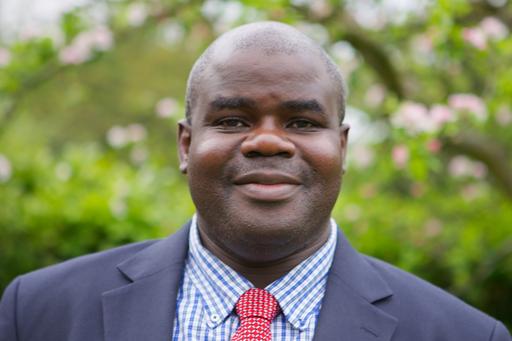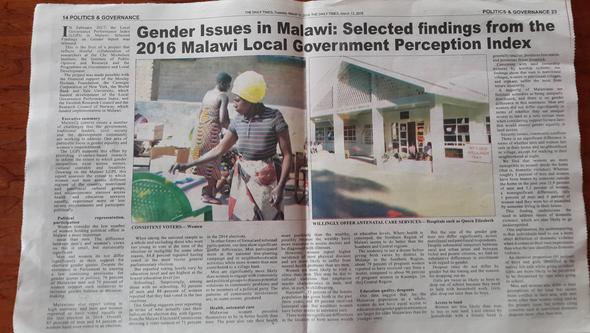Collaboration between GLD and IPOR
The Program on Governance and Local Development (GLD) is a research program, originally founded in 2013 at Yale University by Program Director, Professor Ellen Lust. GLD focuses on the local factors driving governance and development. Among a range of cooperation partners, GLD has collaborated with the Institute of Public Opinion and Research (IPOR) in Malawi since 2015.
2021-04-21

Dr Boniface Dulani is one of the founders and now senior partner in IPOR. He is also a member of the GLD board.
Mr Dulani, could you please tell us more about IPOR; how it started and what it is you do?
“It all started in 2013 by myself and a colleague, Prof. Blessings Chinsinga . We are both faculty members of the University of Malawi.
“We saw that there was a gap between policy and ordinary citizens. Often we hear policymakers or politicians saying that the people want this, that people want that. But usually there's very little evidence to suggest that this is really what the people on the ground are actually saying that they want.”
“Blessings and I have background research experience, gained mostly through working within the pan-African research network, the Afrobarometer. Our plans were to draw upon that research experience and apply it at the local level, focusing on assignments that are more applicable to Malawi than the Afrobarometer’s broader research agenda.”
“Our initial focus at IPOR was public opinion surveys in the field of governance. But over the years we've expanded our portfolio to cover social science research more broadly– in areas like education, public health, development, livelihoods, communication, and others…"
You have been collaborating with the GLD since 2015 in a number of projects. The first being one on Local Governance Performance Index. How was that developed, and what results have you seen since the index started to be implemented?
“Well, the Local Government Performance Index project in 2015 – 2016 was of course part of the GLD flagship research project. The project’s main interest was to find out about access to social services at the local level, for example, people’s access to water, to public health services, to education, etcetera. But the project also sought to find out about livelihood issues such as landownership, gender and decision making processes.”

“Apart from generating the data, there was also a component of dissemination where we went around the country sharing the research results with the survey respondents themselves, as well as with the public officials in selected districts in Malawi.”
The survey respondents were able to challenge the public officials insisting that the study was a true portrayal of the reality on the ground.
“In one case we gave a presentation to public officials in Dedza district in central Malawi. This event brought together public officials and a select number of the study respondents. In the course of discussing the study findings about government services at the local level, the government officials became very defensive, disputing some of the findings on service availability′. But the survey respondents were able to challenge the public officials insisting that the study was a true portrayal of the reality on the ground, ′No, these services might be available on paper, in your office, but on the ground, that is not the case′.”
“This, in my view, highlights the disconnect that sometimes exists between policymakers and the ordinary citizens. And that's why this research, in my view, was very rich in, among many things, establishing what is available on the ground and what challenges people are facing in accessing these services.”
“With the index, we're able to produce district profiles that what we call ′district briefs′ that highlight the development challenges ordinary Malawians face on a daily basis, for example on education. I know that government officials have been using some of these profiles to better understand the situation on the ground. This includes legislators reaching out to us at IPOR to learn more from our findings.”
“I would say that the reason legislators reach out to us in IPOR is because most of them don't have research staff that can help them gather data like you have in Sweden and Norway and the rest of Europe. They would not be in a position to get access to this kind of data otherwise.”
After this initial project, IPOR and GLD have been collaborating in a handful of subsequent projects. Last year, you adapted to the Covid-19 situation and launched a project on how to understand the challenges that citizens face during the pandemic…
[GLD and IPOR conducted a survey where people described the situation in relation to Covid-19 that the meet in their everyday life. One main finding was that people were more afraid of starvation than the pandemic.]

“Most research that's been done on covid-19 in Malawi has tended to focus on the medical side of the pandemic. So after we released these discoveries, there was a lot of requests from different quarters, including government officials, CSOs, researchers and others. We also reached out to the Ministry of Health in Malawi, as well as the presidential task force that’s leading the fight against covid-19 in the country, to share our findings and highlighted a number of issues that the government needs to be aware of.”
“Just to give an example of some of the policy lessons from the GLD/IPOR study; the Malawi government has been asking individuals that test positive for Covid to self-quarantine in their homes. But our study findings showed that not many Malawians have enough room in their houses to quarantine and then separate themselves from other individuals. If you are living in a single bedroom house, then, of course, there's only so much self-quarantine that you can do.”
“Or to give another example: what are people's perceptions about face masks or the COVID-19 vaccines? The research has shown that people have so many misconceptions based on misinformation about the effects of using face masks or vaccines, resulting in reluctance to use face masks or getting vaccinated. If the government does not address these misconceptions, then the fight against covid-19 could be futile.”
“Since then, we have been invited to join the Ministry of Health COVID-19 research cluster, providing with a key platform to share our data and insights from the GLD/IPOR Covid-19 studies with public officials who in turn use this to inform the design of strategies against Covid-19.”
Our findings showed that Malawians were more worried about dying from hunger than from covid-19.
“In terms of some of the policy outcomes, our findings showed that Malawians were more worried about dying from hunger than from covid-19, especially since government was not providing any social welfare support. Now the government has started to make some cash transfers in urban areas. Of course, that decision is not only based on our findings, but clearly it must have had some influence.”
“There has also been an intensified civic education campaign about, for instance, vaccinations, the importance of face masks and the like.”
“In my view, this has been really one of the greatest impacts that we've had. And it's giving us direct space with policymakers. Many interested stakeholders have been coming to us to learn about our findings based on social data so that they can better understand some of the issues connected to the covid-19 beyond the medical ones.”